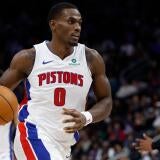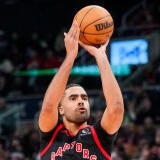
Thunder GM Sam Presti says small-market teams operate with 'significant disadvantages'
The longtime Thunder GM explained his stance in a piece written to the team's fan base
It's no secret -- the Oklahoma City Thunder are in rebuilding mode.
After building itself as an annual playoff contender over the past decade since their move from Seattle to Oklahoma City in 2008, it's finally looking as if the Thunder could miss the playoffs for just the second time since the 2009-10 season after this summer's moves. With Kevin Durant and Russell Westbrook no longer in a Thunder uniform for the first time since the 2006-07 season, Oklahoma City faces an uphill battle just to make the postseason in 2020.
General manager Sam Presti, who has served in that role since the team's move to Oklahoma City in 2008, released a long essay via The Oklahoman on Thursday which addressed the team's fan base. While much of its objective was to keep the fan base upbeat following the franchise's trade of Westbrook to the Houston Rockets, Presti had one very interesting thing to say in the article -- that given the NBA's current structure, small-market teams are at a clear disadvantage.
Oklahoma City expects, and deserves, extraordinary success. Delivering this is what drives us. But I want to be transparent and realistic about the process that meeting these types of expectations may require. Despite our city's rapid rise and growth, Oklahoma City remains the second-smallest market in the NBA. While this brings many benefits, it also poses strategic challenges. Given the way the league's system is designed, small market teams operate with significant disadvantages. There is no reason to pretend otherwise. This in no way means we cannot be extraordinarily successful — we, and several other small to mid-market teams, are our own best examples of the ability to overcome these realities. It simply means we must be thinking differently, optimistically, finding our advantages by other means.
Presti didn't delve into the exact details as to why small-market teams are at a disadvantage, but it doesn't take a genius to see that two of the NBA's major contenders for the championship this season -- the Los Angeles Lakers and the Los Angeles Clippers -- are from a major market. In fact, both franchises became championship favorites overnight due to the Lakers' acquisition of Anthony Davis and the Clippers' deal with Kawhi Leonard coupled with the trade they made for former Thunder forward Paul George.
A major point of concern for the NBA over recent years has been whether or not these small-market teams can retain major franchise players in order to continue their success. The most notable example in the not so distant future is whether or not Giannis Antetokounmpo will remain with the Milwaukee Bucks. The league's reigning MVP will be a free agent following the conclusion of the 2020-21 season. In fact, it's the reason why the league instituted new rules that give current teams an advantage in retaining their free agents by giving them the ability to offer longer-term deals that come with more money.
Taking all of this into consideration, let's be realistic when it pertains to Oklahoma City's own situation. Despite being a small market franchise, they've had three of the top players in the NBA over the past decade on their team at one point -- Durant, Westbrook and James Harden. They also had Paul George over the past couple of seasons and were also able to acquire a 10-time All-Star in Carmelo Anthony just a couple seasons prior.
In other words, the Thunder have had their stars and they simply never got over the hump by winning a title. Is it true that maybe it's a little bit harder to convince these superstars to stay long term in a small market like Oklahoma City? Maybe so. But that's the case for every NBA franchise these days. Kyrie Irving bolted the Boston Celtics for the Brooklyn Nets after just two years. Durant left the Warriors after just three years for the Nets.
And although the Golden State Warriors have dominated the NBA's landscape over recent years, the San Antonio Spurs -- one of the league's smallest market teams -- have been the model of success in the NBA in the new century, winning five titles in the past 20 years alone.
While Presti may believe that the current system makes it difficult for the Thunder to sustain long-term success, the facts say otherwise.


















